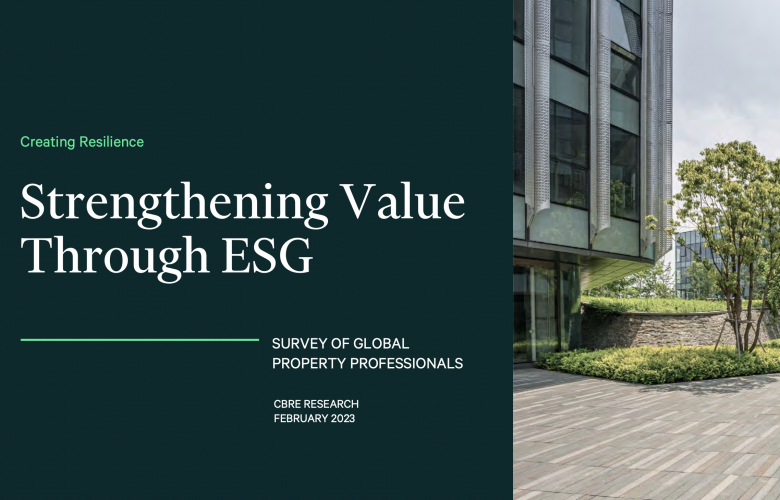Companies are favoring environmental, social and corporate- governance (ESG) factors more heavily in their decisions on which buildings to lease or buy, with many prioritizing green-building certifications and features that reduce energy consumption or generate renewable energy, according to a new global survey from CBRE.
The survey examines responses collected in Fall 2022 from more than 500 commercial real estate professionals worldwide. Overall, more than two thirds of respondents said their companies’ focus on ESG intensified in 2022 and that their primary ESG consideration for their real estate is to reduce energy consumption and carbon emissions.
Environmental features drive building appeal and transactions.
As companies face rising energy costs and government regulations, they’re willing to pay a premium for spaces with features like on-site renewable energy generation (58%) or smart technology to monitor and adjust energy use (53%) to help reduce energy consumption and carbon emissions.
In fact, 84% of respondents said they specifically look for energy-reducing features - and almost half would either seek a discount or walk away from a deal if a building lacked these.
Another big ESG influence is green-building certification, such as the Leadership in Energy and Environmental Design (LEED) rating system or several administered by the Green Building Council. Forty-five percent of respondents would pay a premium to lease or buy a certified building, and a third would either seek a discount from or outright reject a building that lacked certification.
The survey consists of perspectives from investors and occupiers in major categories of commercial real estate in the U.S., Asia Pacific, the U.K., and Europe (excluding the U.K.). Many survey participants have offices in several of the regions, with the largest shares of respondents claiming offices in the U.K. and Europe and the third-largest share claiming U.S. offices. The survey found mostly minor regional differences in the ESG initiatives that companies are focused on, their motivations for pursuing ESG goals and the challenges they face in achieving them.
“The voice of our clients on this topic is clear,” said Dr. Henry Chin, Global Head of Investor Thought Leadership, Asia Pacific for CBRE. “Reducing emissions is at the forefront for our clients, and they see ESG goals impacting all aspects of real estate decision making. According to our Asia Pacific Sustainable City Ranking launched last December, Australia, Japan, and Singapore lead the rest of Asia Pacific in green building adoption, other markets in the region are catching up quickly. Investors must tailor ESG strategies that align with the local situation, rather than adopt a one-size-fits-all approach.”
Certain social features entice companies to pay a premium.
Tolerance for long commute times has waned considerably among employees in recent years, and companies have taken notice. Eighty-two percent of respondents named convenient access to public transportation as the social feature that most affects their interest in a given building, because easier commutes are associated with better employee well-being.
Companies are also placing a higher value on buildings that support their employees’ mental and physical health. For example, respondents said buildings that make it easier for employees to ride their bike or walk (66%) and have an inclusive design to meet the needs of all employees (58%) are more attractive than those with an absence of those features.
“Employees in Asia Pacific tend to spend more time working from office and commute time to work remains a key consideration in job selection,” said Ada Choi, Head of Occupier Research, Asia Pacific for CBRE. “We foresee that the current tenant-favoured market will create more opportunities for occupiers to trade-up to higher quality workplace in prime location with health and wellness features and other ESG benefits.”
Other findings discussed in the survey report include:
- Organizational ethics and values: Although government regulation and higher energy prices are contributing external factors, 63% of respondents said company ethics, values or purpose remain the main driver behind their respective ESG priorities.
- Building resilience: With natural disasters becoming more common, 75% of respondents cite a building’s resilience to effects of climate change as having an impact on their real estate decision.
- Challenges for implementing ESG goals. The most common challenge across all regions was the lack of quality data (53%), followed by costs (47%) and uncertainty of benefits (36%).
To read the full survey, click here.









